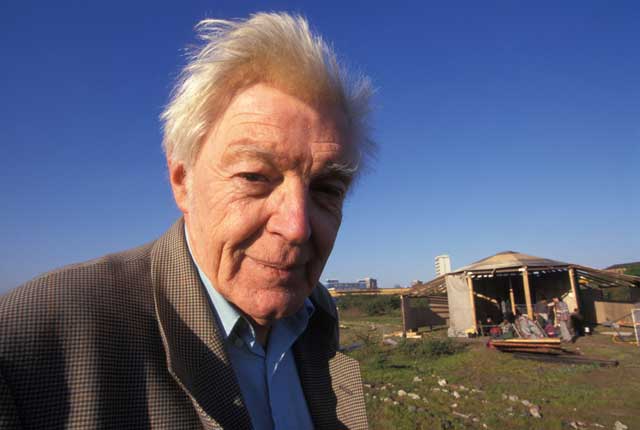Boyd Tonkin: The good life of a gentle anarchist
The Week In Books

This week I heard David Cameron extol the virtues of mutual aid and co-operative work with feelings so mixed that they zigzagged between exasperation and exultation. A few days ago, one of Britain's most original thinkers and writers died aged 85. You may not have heard of him, for Colin Ward was a lifelong anarchist – of the sweetest, gentlest kind. He spent more than 60 years helping to foster the cheerful, co-dependent, self-help society that every tribal politician now promotes.
Colin stood as far from big-state Labourism as he did from big-money Toryism. His early struggles – as a young ex-soldier from Essex, back in the late 1940s – saw him defending the squatters who took over military bases during a postwar housing crisis. Over decades, in a series of path-breaking books, he sought out and celebrated bottom-up solutions to finding decent shelter, doing worthwhile work, growing up happy, and getting on with others in town and country. The Whitehall-knows-best apparatchiks of the Labour tradition distrusted his brand of autonomous action; while it goes without saying that this (peaceable) disciple of Kropotkin would have greeted the "Red Toryism" now endorsed by the heirs of large landowners and rich financiers with a genial chuckle.
Forgive a little detour into memory. Long ago, when Colin already enjoyed a huge semi-underground reputation as a fountainhead of fresh ideas, I went to run a section of the New Statesman magazine that enfolded the remnants of New Society. As a chronicler and analyst of postwar change, that journal had done a bolder, brighter job of showing us new times than any media outlet today. And, every week, I found myself editing a column that took me into the scrap-screwn, mutt-friendly, off-the-books heart of another Britain.
In Colin Ward's Utopian junkyard, scruffy, unrespectable people and places survived and thrived on the edge of wealth, influence – even legality. As far as mainstream journalism went, these marginals and mavericks might as well have lived on Pluto. Often taking as his subjects people in or near his own Suffolk village, he championed the twilight world of allotment-diggers, unofficial smallholders, prefab dwellers, caravan habitués, rural squatters, estate children, multi-tasking traders, DIY artisans and house-builders, most as remote from the trim land of planning applications as they were from tax demands. If you needed to reclaim a bad word, you might even want to say that Colin opened the gates of Pikey Paradise and praised all its delights.
Alternatively, you might argue that he wrote social theory to justify the convivial rule-flouting of HE Bates's Pop Larkin and The Darling Buds of May – while reminding us that the meddling over-mighty state always commits the biggest scams of all. Now the metropolitan intelligentsia has - via Jez Butterworth's play Jerusalem – snatched a faint glimpse of the terrain Colin cultivated with such humanity and charm. His Britain was never broken, because it knew how to mend itself.
Thankfully, he left a long shelf-full of invigorating books. They include the classic Anarchy in Action; a history of The Allotment (with David Crouch); The Child in the City; and a study of the free-style co-op home-making that often inspires his work, Cotters and Squatters. Localism, mutualism, voluntarism: Colin gave a smiling face to all the windy words our masters now invoke.
However, in spite of sterling work by the Five Leaves imprint in Nottingham, too few of his landmark texts exist in a form that non-specialists can reach. As every pundit and politician gestures towards a more congenial, more self-organising nation, and so few have the slightest notion of how to get there without grandiose top-down schemes, we need a handy volume of the Selected Colin Ward in every bookshop, or on every screen. Then the millions of eager fugitives from greed and fear can really get down to digging for victory.
P.S.Will the slowdown in publishing further narrow the range of what we can read? Recession, or the fear of it, has squeezed the total number of books in translation that I and my co-judges are reading for this year's Independent Foreign Fiction Prize. The quality, thankfully, remains admirably high – and it's up to champions of global literature in big houses as well as the stalwart indies to keep it that way. Within Random House, Harvill Secker still flies a multi-national flag for fiction. And on Saturday 27 February, the imprint will be hosting an International Writing Day at Foyle's in London (www.foyles.co.uk/events). Authors include the terrific Galician writer Manuel Rivas, Israel's Alon Hilu, and Xiaolu Guo (left), as well as AS Byatt and Joseph O'Connor. The ticket price (£18) even includes a goodie bag with a signed novel by Umberto Eco.
b.tonkin@independent.co.uk
Join our commenting forum
Join thought-provoking conversations, follow other Independent readers and see their replies
Comments
Bookmark popover
Removed from bookmarks